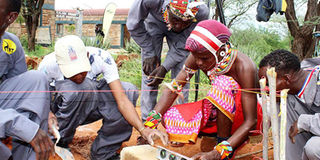Premium
Training gives Samburu morans new skills to boost income

A moran demonstrates how to lay a foundation for a house at Kalama Conservancy in Samburu county during graduation after the young men underwent vocational training. PHOTO | GITONGA MARETE | NATION MEDIA GROUP
What you need to know:
- For decades, the young members of the pastoral community depended solely on livestock.
- This often led to conflicts over water and pasture, as well as cattle rustling.
- Nominated Senator Abshiro Halake said there is a need for creative solutions to cattle rustling.
A training programme for morans in Samburu County is revolutionising their lives.
For decades, the young members of the pastoral community depended solely on livestock, which often led to conflicts over water and pasture, as well as cattle rustling.
But the young men are now learning new skills, which are reducing their dependence on livestock.
Through an initiative by the Northern Rangelands Trust (NRT), the morans are being trained on repairing motor bikes and phones, building using blocks and welding.
TRAINING IN VILLAGES
Known as Ujuzi Manyattani, the programme involves tutors from Kiirua Technical Training Institute and Laikipia North Technical Institute taking vocational training to morans in the villages.
In its pilot stage, it is targeting young men without education in three community conservancies, namely Ltungai, Westgate and Nkoteiya.
It is funded by the Swedish Embassy under the Imara Programme Consortium, according to community economic director Ture Boru.
Speaking in Kalama, Samburu County, last Saturday, when the first batch of 60 graduated after a three-month training, their excitement about the skills they had learnt was palpable.
SKILLS LEARNT
“We learnt masonry, welding and electronics and our lives have been transformed. We used to rely only on selling livestock, but this training has broadened our income base. By repairing motorbikes and building, we get more money,” Lobore Lenkata said, adding that in a good week, he can make up to Sh10,000.
“We also used to steal livestock from other communities but we have stopped that to concentrate on our businesses. This project is helping us integrate with other communities because we work together,” added Lokeno Toriepe.
“Before this training, people would come from as far as Meru and Nanyuki to repair mobile phones and motor bikes, but now we can do it and earn money,” he said.
JOBLESS YOUTH
NRT Chief Executive Officer Tom Lalampaa said they started the programme after realising that there were so many jobless young men who needed to be occupied.
“Conservancies give bursaries to those in school but there was a need to ensure that those not in formal education are also catered for. This training model is compatible with the lives of people living in arid and semi-arid areas because they can learn without interfering with their lives,” he said.
“There are plans to upgrade this training to include other courses such as plumbing, leather work and tour guiding and roll it out to other conservancies. We will also incorporate training for girls who are not in school,” he added.
REPLICATE PROJECT
Vocational Training Principal Secretary Kevit Desai, who was the chief guest, said the national government will work with the counties and replicate the project among other pastoralist communities so that young men are encouraged to pursue alternative income-generating activities to address insecurity and cattle rustling.
“There are 39 conservancies spread over 10 counties and we look forward to partnering with technical institutions and taking this project to these areas,” he added.
Nominated Senator Abshiro Halake said there is a need for creative solutions to cattle rustling.
Noting that technical colleges admit only those with secondary school education, thereby locking out the morans, she said the project is a step in the right direction since it has shown that the morans can be taught skills even without formal education.





